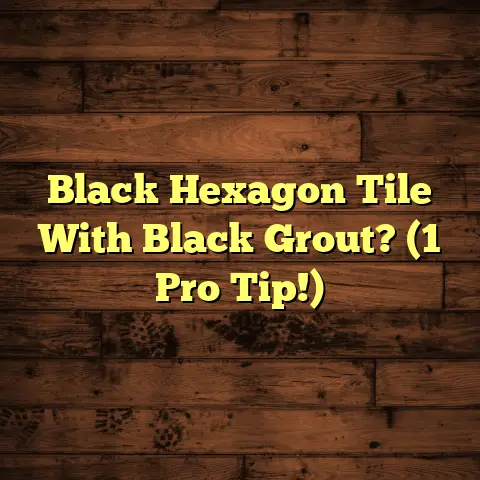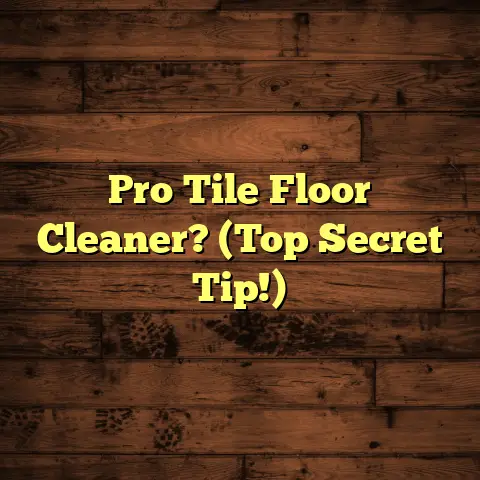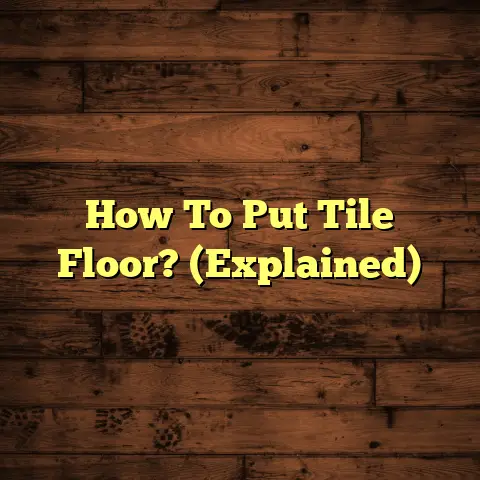Hardwood Floor Wash? (5 Wrong Cleaners Ruin!)
From stunning, century-old planks to floors that look like they’ve been through a war zone, I’ve learned one thing: hardwood is tough, but it’s not invincible.
The secret to a long-lasting, beautiful hardwood floor? Proper care, and that starts with the right cleaning products. Trust me, using the wrong cleaner is like giving your floor a slow, agonizing demise.
Think of it this way: You wouldn’t wash your fancy sports car with dish soap, right? Same principle applies here. So, let’s dive into the world of hardwood floors and uncover the cleaning sins that can ruin them!
Understanding Hardwood Floors
Composition and Types of Hardwood
Hardwood floors aren’t just “wood.” They’re crafted from a variety of tree species, each with its own unique characteristics.
Oak, for example, is a classic choice, known for its durability and distinctive grain. Maple offers a smoother, more modern look, while cherry brings a touch of elegance with its rich, reddish hue.
Then there’s the finish. Oil-based finishes penetrate the wood, providing a natural look and feel, but they require more maintenance. Water-based finishes are more durable and eco-friendly, offering better protection against scratches and wear.
Here’s a quick breakdown of popular hardwood types:
| Wood Type | Hardness (Janka Scale) | Appearance |
|---|---|---|
| Red Oak | 1290 | Reddish-brown, prominent grain |
| White Oak | 1360 | Light to medium brown, subtle grain |
| Maple | 1450 | Creamy white to light brown, smooth |
| Cherry | 950 | Rich reddish-brown, fine grain |
| Hickory | 1820 | Light to medium brown, varied grain |
Source: National Wood Flooring Association (NWFA)
Benefits of Hardwood Flooring
Why do people love hardwood so much? Well, besides looking fantastic, it adds real value to your home. According to the National Association of Realtors, homes with hardwood floors often sell for higher prices and spend less time on the market.
But it’s not just about the money. Hardwood floors are also a healthier choice. Unlike carpets, they don’t trap dust, pollen, and other allergens, leading to better indoor air quality. Plus, they’re incredibly durable, lasting for decades with proper care.
Common Myths About Hardwood Flooring
Let’s bust some myths, shall we? One big one is that hardwood floors are super delicate and require constant pampering. While they do need care, they’re not as fragile as some people think. Another myth is that all hardwood floors are the same. As we discussed earlier, the type of wood and finish make a huge difference in terms of durability and maintenance.
Finally, there’s the myth that you can clean hardwood floors with anything. This is where the trouble starts! Using the wrong cleaner can strip the finish, damage the wood, and leave you with a costly repair bill.
The Importance of Proper Cleaning Techniques
Why Cleaning Matters
Think of your hardwood floor as a fine piece of furniture. You wouldn’t let dirt and grime build up on your dining table, would you? Regular cleaning is essential for maintaining the finish, preventing scratches, and removing dirt that can wear down the wood over time.
A clean floor not only looks better, but it’s also healthier. Removing dust and allergens can improve your home’s air quality and reduce the risk of allergies and respiratory problems.
Do’s and Don’ts of Hardwood Floor Care
Okay, let’s get down to the basics.
Do’s:
- Sweep or vacuum regularly: This removes loose dirt and debris that can scratch the finish.
- Use a microfiber mop: These mops are gentle on the floor and effectively pick up dirt and dust.
- Use a pH-neutral cleaner: This will protect the finish and prevent damage to the wood.
- Clean up spills immediately: Liquids can seep into the wood and cause staining or warping.
- Use mats and rugs: Place mats at entryways to trap dirt and rugs in high-traffic areas to protect the floor from wear.
Don’ts:
- Use abrasive cleaners: These can scratch the finish and damage the wood.
- Use too much water: Excess water can seep into the wood and cause it to warp or swell.
- Use steam mops: The heat and moisture can damage the finish and warp the wood.
- Use oil-based soaps: These can leave a sticky residue that attracts dirt.
- Wear shoes with heels: Heels can dent and scratch the floor.
The Risks of Wrong Cleaners
Introduction to Wrong Cleaners
Alright, let’s talk about the elephant in the room: the cleaners that are secretly sabotaging your hardwood floors. Not all cleaners are created equal, and using the wrong one can lead to irreversible damage.
I’ve seen floors that have been dulled, discolored, and even warped by harsh chemicals. It’s a heartbreaking sight, especially when it could have been avoided with a little knowledge.
Criteria for Choosing a Cleaner
So, what should you look for in a hardwood floor cleaner? Here are a few key qualities:
- pH-balanced: A neutral pH will protect the finish and prevent damage to the wood.
- Non-toxic: Avoid cleaners with harsh chemicals that can be harmful to your health and the environment.
- Specifically designed for hardwood floors: These cleaners are formulated to be gentle on the finish and effective at removing dirt and grime.
- Streak-free: A good cleaner should leave your floors looking clean and shiny, without any streaks or residue.
- Easy to use: Look for a cleaner that is easy to apply and doesn’t require rinsing.
The Five Wrong Cleaners That Ruin Hardwood Floors
Okay, drumroll please… Here are the five culprits that are most likely to ruin your hardwood floors:
1. Vinegar
Vinegar is often touted as a natural cleaning wonder, but trust me, it’s a no-go for hardwood floors. While it’s effective at cutting through grease and grime, vinegar is acidic, which means it can break down the protective finish on your floors.
Over time, this can lead to dullness, discoloration, and even damage to the wood itself. I’ve seen floors that have been stripped of their shine and left looking lifeless after repeated vinegar treatments.
2. Ammonia-Based Cleaners
Ammonia is another harsh chemical that should never be used on hardwood floors. It’s a powerful cleaner, but it can also strip away the finish and leave a cloudy appearance.
Ammonia can also damage the wood fibers, making them more susceptible to scratches and wear. I’ve seen floors that have been aged prematurely by ammonia-based cleaners, looking years older than they actually are.
3. Oil-Based Cleaners
You might think that oil-based cleaners would be good for hardwood floors, since wood is naturally oily. However, these cleaners can actually do more harm than good.
Oil-based cleaners tend to leave a sticky residue that attracts dirt and grime. This can make your floors look dull and dirty, even after you’ve just cleaned them. The residue can also be difficult to remove, requiring harsh chemicals that can further damage the finish.
4. Bleach
Bleach is a powerful disinfectant, but it’s way too harsh for hardwood floors. It can discolor and damage the wood fibers, leading to permanent staining and weakening of the material.
I’ve seen floors that have been bleached by accident, leaving unsightly white patches that are impossible to remove. Bleach can also damage the finish, making the floor more susceptible to scratches and wear.
5. Multi-Surface Cleaners
Multi-surface cleaners are convenient, but they’re often not the best choice for hardwood floors. These cleaners typically contain a blend of chemicals that are designed to clean a variety of surfaces, but they may not be gentle enough for hardwood.
Some multi-surface cleaners contain harsh chemicals that can damage the finish or discolor the wood. Others may leave a sticky residue that attracts dirt and grime. It’s always best to use a cleaner that is specifically designed for hardwood floors.
Recognizing the Signs of Damage from Improper Cleaning
Visual Indicators
How can you tell if you’ve been using the wrong cleaners on your hardwood floors? Here are a few visual indicators to look out for:
- Dullness: The finish looks faded or lacking in shine.
- Discoloration: The wood appears lighter or darker than it should.
- Scratches: The floor is easily scratched or damaged.
- Residue: A sticky or oily film is visible on the surface of the floor.
- Warping: The wood is starting to buckle or swell.
Long-Term Effects
The long-term effects of improper cleaning can be costly and time-consuming to repair. If you continue to use the wrong cleaners, you may eventually need to refinish your floors.
Refinishing involves sanding down the old finish and applying a new one. This can be a messy and expensive process, but it’s often the only way to restore the beauty and luster of your floors. In severe cases, you may even need to replace the entire floor.
Conclusion
So, there you have it! The five wrong cleaners that can ruin your hardwood floors. Remember, hardwood floors are a valuable investment, and they deserve to be treated with care.
By using the right cleaners and following proper cleaning techniques, you can keep your floors looking beautiful for years to come. Don’t fall for the myth that all cleaners are the same. Choose wisely, and your floors will thank you!
Call to Action
Now, I want to hear from you! Have you ever made a cleaning mistake that damaged your hardwood floors? What are your favorite hardwood floor cleaning tips? Share your experiences and questions in the comments below! Let’s learn from each other and keep our hardwood floors looking their best!





